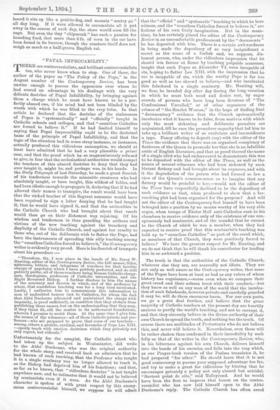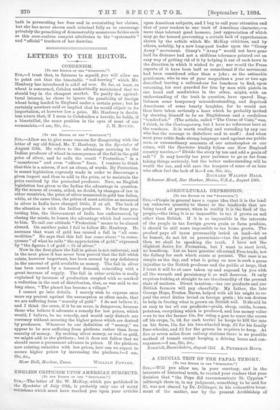"PAPAL IMPECCABILITY." T HERE are controversialists, and brilliant controversialists too, who
never know when to stop. One of these, the author of the paper on " The Policy of the Pope," in the August number of the Contemporary Review, has been unwise enough to pursue the opponents over whom he lad scored an advantage in his dealings with the very 'delicate doctrine of Papal Infallibility, by bringing against them a charge which he must have known to be a per- fectly absurd one, if his mind had not been blinded by the wrath with which he was filled to the very brim. In that article he declared that the doctrine of the sinlessness of Popes is " systematically " and "officially" taught in Catholic schools and colleges, and that " countless Catholics are forced to believe it." If he had limited himself to saying that Papal Impeccability ought to be the doctrinal basis of the principle of Papal Infallibility, and that the logic of the situation had in some stray instance, or instances, actually produced this ridiculous assumption, we should at least have admitted that he had a very plausible a priori -case, and that the proof which he so magnanimously ref a sed to give, in fear that the ecclesiastical authorities would compel the teachers of this absurd doctrine to deny that they had ever taught it, might be, and perhaps was, in his hands. In the Daily Telegraph of last Saturday, he made a great flourish of his tenderness towards the miserable creatures who had absolutely taught, or been taught, this wildest of fables, and had been idiotic enough to propagate it, declaring that if he had allowed their names to transpire, the result would have been that the wicked teacher of this flagrant nonsense would have been required to sign a letter denying that he had taught it, that he would have signed it, and that the authorities in the Catholic Church who had brought about that result would then go on their dishonest way rejoicing. Of his wisdom and tenderness in thus guarding the authors and victims of the new teaching against the treachery and duplicity of the Catholic Church, and against her cruelty to those who, out of the deliberate wish to flatter the Pope, had been the instruments of spreading this silly teaching among the "countless Catholics forced to believe it," the Contemporary writer is evidently very proud. Here is his flourish of trumpets about his procedure :— " Therefore, Sir, I now place in the hands of Mr. Percy W. Bunting, editor of Contemporary Review, the full names, titles, addresses, letters, and telegrams of vouchers for that terrible ,charge of papolatry which I have publicly preferred, and do still publicly prefer, all of those vouchers being Roman Catholic clergy- men, theologians, professors of Catholic universities, and one Right Reverend Bishop. I further disclose to him the names of the seminary and diocese in which, and of the professor by -whom, that scandalous teaching was for a long time inculcated. Lastly, I authorise him to communicate this information to men of undoubted honour (not to Catholics, for whom the fact that Abbe Duchesne advanced and maintained the charge with impunity, is proof sufficient), on condition that they abstain from -publishing these names, but on the understanding that they may, if they think fit, sift the matter to its nethermost foundations, wherein I promise to assist them. At the same time I give him the names of the witnesses—all of them Catholic priests and pro- 'fessors—who are prepared to prove that some of our teachers— among others a prelate, cardinal, and favourite of Pope Leo XIII. —openly teach with unction doctrines which they privately not only regret, but ridicule."
Unfortunately for the essayist, the Catholic priest who had taken up the subject in Westminster, did write to the Abbe Duchesne, who was the original authority for the whole story, and received back an admission that he had known of such teaching, it in a single seminary was no 1 that the Professor who taught As the Bishop longer allowed to teach it, had deprived him of his functions ; and that, so far as he knows, that " ridiculous doctrine " is not taught Anywhere now, and he intimates that it would not be believed by seminarists even if it were. As the Abbe Duohesne's -character is spoken of with great respect by this anony- mous controversialist himself, we suppose he will admit that the " official " and " systematic " teaching to which he bore -witness, and the "countless Catholics forced to believe it," are fictions of his own lively imagination. But in the mean- time, he has certainly placed the editor of the Contemporary Review in an uncomfortable predicament by the "documents " he has deposited with him. There is a certain awkwardness in being made the depositary of so very insignificant a secret as the name of a foolish and, we suppose, dis- honest person, who, under the ridiculous impression that he should win favour at Rome by teaching palpable nonsense, taught that such Popes as Alexander VI. were incapable of sin, hoping to flatter Leo XIII. with the impression that he too is incapable of sin, which the worthy Pope is far too good as well as too shrewd to believe,—and who inculcated this falsehood in a single seminary. Mr. Bunting will, we fear, be invaded day after day during the long vacation in which he must both need and desire rest, by eager crowds of persons who have long been devotees of " The Confessional Unveiled," or of other exposures of the crimes of " the Scarlet Woman," in the hope of finding final " documentary " evidence that the Church systematically inculcates what it knows to be false, from motives with which only the most sickening and deliberate parasites are acquainted, till he rues the premature sagacity that led him to take up a brilliant writer of so credulous and inconsiderate a type. Fancy offering to deposit (say) with the editor of the Times the evidence that there was an organised conspiracy of flatterers of the Queen to persuade her that she is an infallible critic of English literature, and that as proof thereof the name of a single idiot who had endeavoured to demonstrate this was to be deposited with the editor of the Times, as well as the names of several witnesses who had been sickened by such blatant flattery and had brought about its exposure, and with it the degradation of the person who had formed so low a view of the Queen's common-sense as to imagine that any flattery would be grateful to her,—would not the editor of the Times have respectfully declined to be the depositary of such evidence as that, when produced to show that a far- reaching plot had been organised for the purpose ? And will not the editor of the Contemporary feel himself to have been betrayed into a position by no means worthy of his very able organ, when troops of Exeter Hall anti-Catholics rush to his chambers to receive evidence only of the existence of one con- spicuously bad seminarist, and of the scandal that he caused to the Church of which he was a member, when they had expected to receive proof that this seminarist's teaching was held up to " countless Catholics " as part of the creed which, as members of that Church, they were positively forced to believe P We have the greatest respect for Mr. Bunting, and we do not think that he will thank his contributor for landing him in so awkward a position.
The truth is that the authorities of the Catholic Church, whatever else they are, are assuredly not idiots. They are not only as well aware as the Contemporary writer, that some of the Popes have been at least as bad as any rulers of whom history has cognisance,—worse even when we compare their great creed and their solemn trust with their conduct,—but they know as well as any man of the world that the inculca- tion of such falsehoods, however private and carefully guarded it may be, will do them enormous harm. For our own parts, we go a great deal further, and believe that the great majority of Catholic teachers at the present day are heartily anxious to purify the world's teaching, and not to corrupt it, and that they sincerely believe in the divine authority of their own Church to spread the truth, and nothing but the truth. Of course there are multitudes of Protestants who do not believe this, and never will believe it. Nevertheless, even these will be rather shaken than confirmed in their incredulity by such folly as that of the writer in the Contemporary Review, who, in his bitterness against his own Church, delivers himself into the hands of his enemies, and falls into the trap which, as our Prayer-book version of the Psalms translates it, he had prepared "for other." He should learn that it is not good controversy to pursue your supposed advantage too far, and try to make a great foe ridiculous by hinting that he encourages privately a policy not only absurd but suicidal. " Surtout point de able," said Talleyrand. And he would have been the first to impress that lesson on the contro- versialist who has now laid himself open to the Abbe Duchesne's reply. The Catholic Church has often erred both in persecuting her foes and in overstating her claims, but she has never shown such criminal folly as to encourage privately the preaching of demonstrably monstrous fables such as this over-zealous essayist attributes to the " systematic " and "official" teachers of her doctrine.



































 Previous page
Previous page